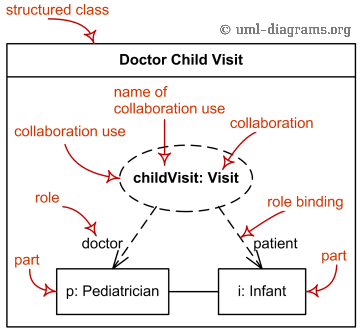Collaboration use represents one particular use (occurrence) or application of the pattern described by a collaboration to a specific situation involving specific classes or instances playing the roles of the collaboration. A collaboration use shows how the pattern described by a collaboration is applied in a given context, by binding specific entities from that context to the roles of the collaboration.
Associated dependencies map features of the collaboration type to features in the classifier. These dependencies indicate which role in the classifier plays which role in the collaboration.
A collaboration use is shown by a dashed ellipse containing the name of the occurrence, a colon, and the name of the collaboration type.
Collaboration use elements - roles, parts, role binding.
Collaboration use childVisit represents one particular use
of the Visit collaboration.
For every role binding there is a dashed line from the ellipse to the client element. The dashed line is labeled on the client end with the role name (as defined by collaboration). Note, that while the text in [UML 2.4.1 Specification] says “dashed line from .. to ..” which suggests direction, there are no arrows shown on several corresponding figures. There is one figure though in the Spec, which does show arrows, so we do show arrows here as well.
https://www.uml-diagrams.org/collaboration-diagrams/collaboration-use.html

